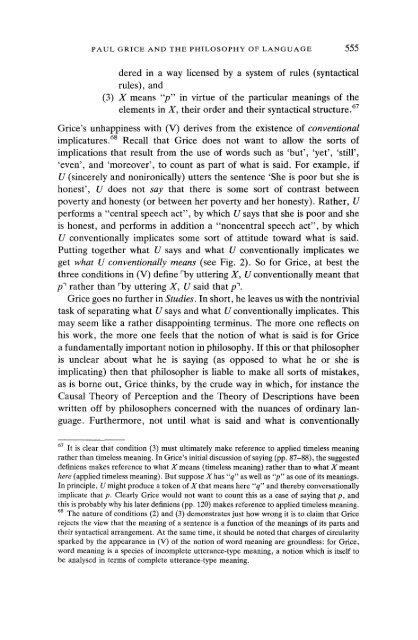Paul Grice and the philosophy of language
Paul Grice and the philosophy of language
Paul Grice and the philosophy of language
Create successful ePaper yourself
Turn your PDF publications into a flip-book with our unique Google optimized e-Paper software.
PAUL GRICE AND THE PHILOSOPHY OF LANGUAGE 555<br />
dered in a way licensed by a system <strong>of</strong> rules (syntactical<br />
rules), <strong>and</strong><br />
(3) X means "p" in virtue <strong>of</strong> <strong>the</strong> particular meanings <strong>of</strong> <strong>the</strong><br />
elements in X, <strong>the</strong>ir order <strong>and</strong> <strong>the</strong>ir syntactical structure. 67<br />
<strong>Grice</strong>'s unhappiness with (V) derives from <strong>the</strong> existence <strong>of</strong> conventional<br />
implicatures. 6s Recall that <strong>Grice</strong> does not want to allow <strong>the</strong> sorts <strong>of</strong><br />
implications that result from <strong>the</strong> use <strong>of</strong> words such as 'but', 'yet', 'still',<br />
'even', <strong>and</strong> 'moreover', to count as part <strong>of</strong> what is said. For example, if<br />
U (sincerely <strong>and</strong> nonironically) utters <strong>the</strong> sentence 'She is poor but she is<br />
honest', U does not say that <strong>the</strong>re is some sort <strong>of</strong> contrast between<br />
poverty <strong>and</strong> honesty (or between her poverty <strong>and</strong> her honesty). Ra<strong>the</strong>r, U<br />
performs a "central speech act", by which U says that she is poor <strong>and</strong> she<br />
is honest, <strong>and</strong> performs in addition a "noncentral speech act", by which<br />
U conventionally implicates some sort <strong>of</strong> attitude toward what is said.<br />
Putting toge<strong>the</strong>r what U says <strong>and</strong> what U conventionally implicates we<br />
get what U conventionally means (see Fig. 2). So for <strong>Grice</strong>, at best <strong>the</strong><br />
three conditions in (V) define ~by uttering X, U conventionally meant that<br />
p~ ra<strong>the</strong>r than ~by uttering X, U said that p~.<br />
<strong>Grice</strong> goes no fur<strong>the</strong>r in Studies. In short, he leaves us with <strong>the</strong> nontrivial<br />
task <strong>of</strong> separating what U says <strong>and</strong> what U conventionally implicates. This<br />
may seem like a ra<strong>the</strong>r disappointing terminus. The more one reflects on<br />
his work, <strong>the</strong> more one feels that <strong>the</strong> notion <strong>of</strong> what is said is for <strong>Grice</strong><br />
a fundamentally important notion in <strong>philosophy</strong>. If this or that philosopher<br />
is unclear about what he is saying (as opposed to what he or she is<br />
implicating) <strong>the</strong>n that philosopher is liable to make all sorts <strong>of</strong> mistakes,<br />
as is borne out, <strong>Grice</strong> thinks, by <strong>the</strong> crude way in which, for instance <strong>the</strong><br />
Causal Theory <strong>of</strong> Perception <strong>and</strong> <strong>the</strong> Theory <strong>of</strong> Descriptions have been<br />
written <strong>of</strong>f by philosophers concerned with <strong>the</strong> nuances <strong>of</strong> ordinary <strong>language</strong>.<br />
Fur<strong>the</strong>rmore, not until what is said <strong>and</strong> what is conventionally<br />
67 It is clear that condition (3) must ultimately make reference to applied timeless meaning<br />
ra<strong>the</strong>r than timeless meaning. In <strong>Grice</strong>'s initial discussion <strong>of</strong> saying (pp. 87-88), <strong>the</strong> suggested<br />
definiens makes reference to what X means (timeless meaning) ra<strong>the</strong>r than to what X meant<br />
here (applied timeless meaning). But suppose X has "q" as well as "p" as one <strong>of</strong> its meanings.<br />
In principle, U might produce a token <strong>of</strong> X that means here "q" <strong>and</strong> <strong>the</strong>reby conversationally<br />
implicate that p. Clearly <strong>Grice</strong> would not want to count this as a case <strong>of</strong> saying that p, <strong>and</strong><br />
this is probably why his later definiens (pp. 120) makes reference to applied timeless meaning.<br />
68 The nature <strong>of</strong> conditions (2) <strong>and</strong> (3) demonstrates just how wrong it is to claim that <strong>Grice</strong><br />
rejects <strong>the</strong> view that <strong>the</strong> meaning <strong>of</strong> a sentence is a function <strong>of</strong> <strong>the</strong> meanings <strong>of</strong> its parts <strong>and</strong><br />
<strong>the</strong>ir syntactical arrangement. At <strong>the</strong> same time, it should be noted that charges <strong>of</strong> circularity<br />
sparked by <strong>the</strong> appearance in (V) <strong>of</strong> <strong>the</strong> notion <strong>of</strong> word meaning are groundless: for <strong>Grice</strong>,<br />
word meaning is a species <strong>of</strong> incomplete utterance-type meaning, a notion which is itself to<br />
be analysed in terms <strong>of</strong> complete utterance-type meaning.














